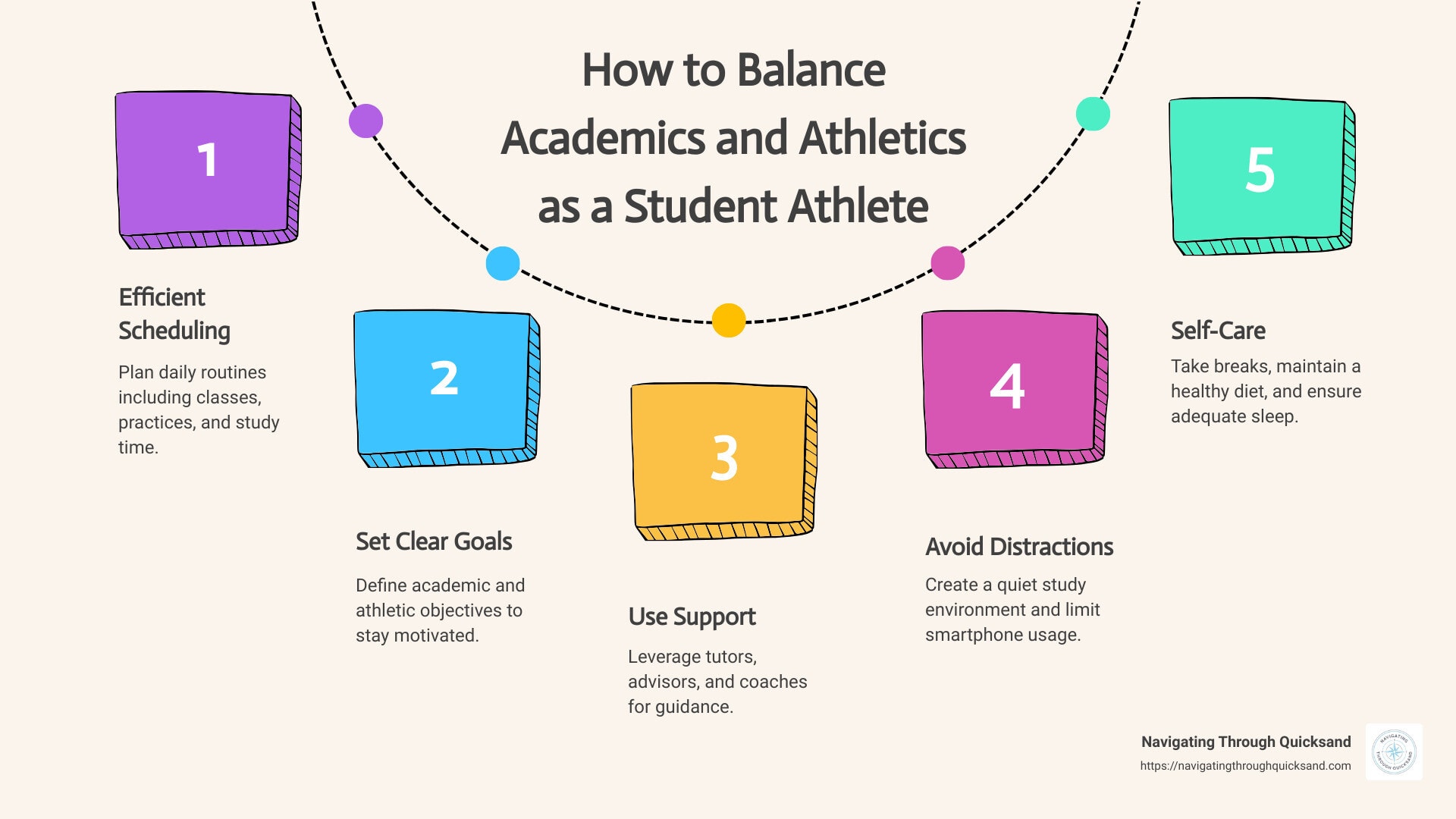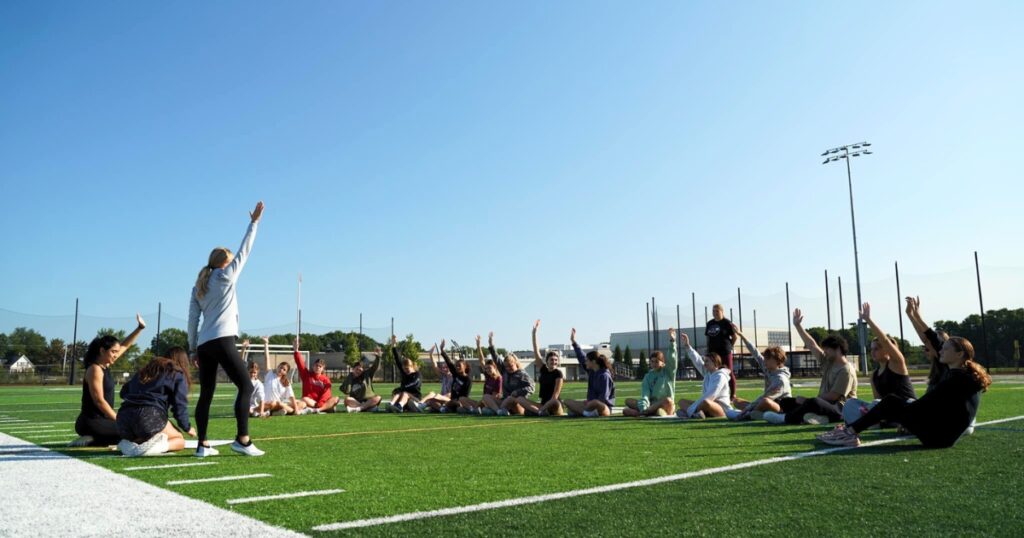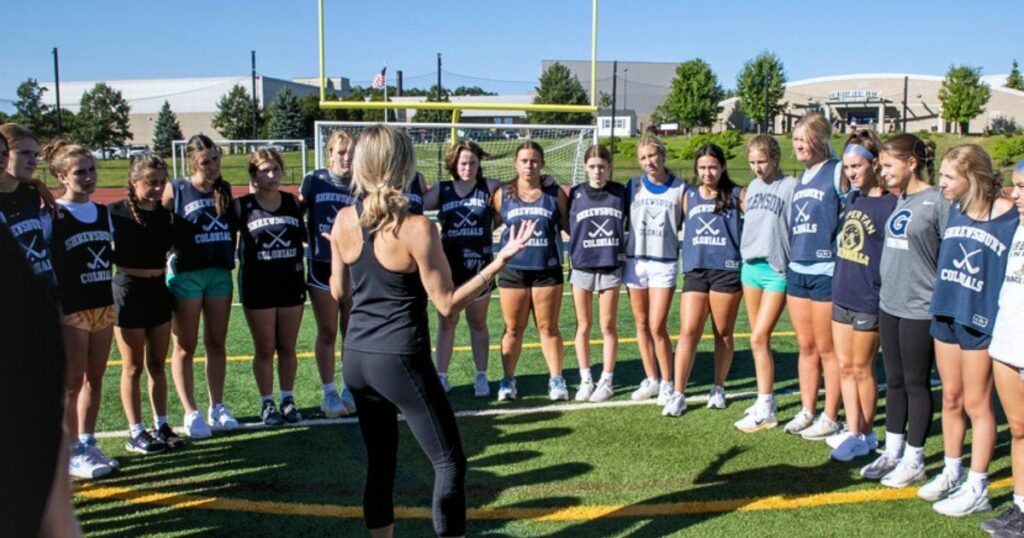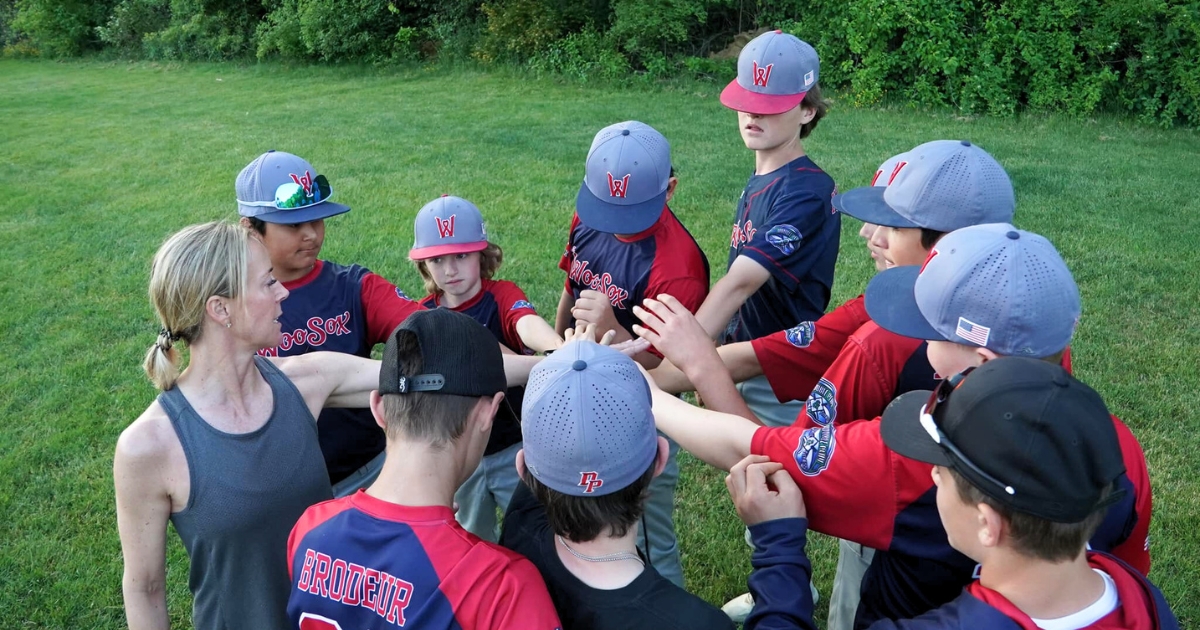Striking the Balance: Navigating Student Athlete Challenges
Student athlete balance is a crucial yet often challenging endeavor. Student-athletes are not just athletes; they juggle the demanding worlds of academics and sports, each requiring time, energy, and dedication. Maintaining a balanced lifestyle is essential for managing these multiple commitments effectively.
Here are three key points:
- Importance:
- Academic excellence opens up recruitment and scholarship opportunities.
- Education provides a foundation for life beyond sports.
- Challenges:
- Time management can be overwhelming.
- Constant pressure to excel in both arenas. Balancing sports with academic responsibilities requires effective time management and prioritization.
- Essentials for Success:
- Efficient scheduling and prioritization.
- Strong support systems.
- Mental wellness and self-care.
The life of a student-athlete is akin to a high-wire act, balancing the pressures of academics and athletics. Effective time management and clear communication are vital. Real-life example: Sarah, a dedicated soccer player, managed her schedule carefully, balancing her academics and sports seamlessly.

Table of Contents
Creating balance isn’t just about finding time; it’s about making the most of your time. With some strategic planning and support, student-athletes can thrive both on the field and in the classroom.
The Importance of Student Athlete Balance
Balancing academics and athletics is crucial for student-athletes. It impacts their academic success, athletic performance, and long-term growth.
Academic Performance
Academic excellence is vital for student-athletes. College recruiters look for well-rounded individuals who excel both on the field and in the classroom. A strong academic profile can open doors to scholarships and better college opportunities.
Balancing sports, academics, and personal life is a crucial part of the college experience for student-athletes.
“College recruiters seek more than just talent; they look for well-rounded individuals who excel academically.” – The Wire For example, Sarah, a soccer player, managed her schedule well and excelled in both areas. On the other hand, John, a basketball player, struggled because he neglected his classes.
Athletic Performance
Balancing academics helps maintain athletic performance. Overloading on either side can lead to burnout or poor performance. For instance, Emily, a cross-country runner, sought support from coaches and advisors, which helped her succeed. High school athletes often face the challenge of managing their time effectively to find a balance between sports and academics.
“My advice to fellow high school student athletes is to prioritize time management, communication, and self-care.” – Sam Friedman, Roswell High School, Golf, Senior. High school sports require student-athletes to navigate the challenges of balancing their academic responsibilities with their athletic commitments.
Long-Term Growth
Education provides a foundation for long-term growth beyond sports. Athletic careers can be short-lived, but academic achievements last a lifetime. Balancing both prepares student-athletes for future challenges.
Education provides a foundation for personal and professional growth, offering opportunities far beyond one’s athletic career.” – The Wire
In summary, balancing academics and athletics is essential for student-athletes. It ensures academic success, sustains athletic performance, and prepares them for long-term growth. With strategic planning and support, they can excel in both areas.
Effective Time Management Strategies: Developing Strong Time Management Skills

Set Up a Schedule
Creating a schedule is crucial for student athlete balance. A structured routine helps you manage practice, homework, and social activities.
David Blanton, a senior soccer player at Roswell High School, emphasizes the importance of planning:
“Whether it be writing it down, putting down reminders, or even just taking a small amount of time and thinking to yourself what you need to do.”
Steps to Set Up a Schedule:
- Daily Routine: Allocate specific times for practice, classes, study, and socializing.
- Use Tools: Planners, calendars, or apps can help you keep track.
- Stick to It: Consistency is key. Follow your schedule to build a habit.
Plan Ahead
Planning ahead prevents last-minute stress. It allows you to break down tasks and manage your workload efficiently.
Charlie Bridges, a senior cross-country runner, suggests reflecting on your day to plan better for the future:
“I also like to reflect on my day every night and learn on how I can grow to be a better person.”
Tips to Plan Ahead:
- Consult Your Syllabus: Know your deadlines and exam dates.
- Break Projects into Chunks: Divide larger tasks into smaller, manageable parts.
- Set Milestones: Achieve smaller goals to stay on track.
Avoid Distractions
Distractions can derail your schedule. Focus on your tasks to ensure you complete them efficiently.
Kenneth “KJ” Smith, a senior football player, advises using calendars and reminders:
“Putting events & assignments on a calendar in advance and setting reminders for myself.”
Strategies to Avoid Distractions:
- Limit Smartphone Use: Turn off app notifications during study time.
- Quiet Study Space: Find a quiet room without TV or outside noise.
- Stay Organized: Keep your workspace tidy and free of distractions.
Incorporating these effective time management strategies will help you balance your academic and athletic commitments. Setting up a schedule, planning ahead, and avoiding distractions are key to succeeding as a student-athlete.
Utilizing Support Systems

Academic Support
Seeking academic support is crucial for maintaining a healthy student athlete balance. Utilizing resources like tutors, study groups, and academic advisors can make a significant difference in your performance.
Emily, a cross-country runner, actively seeks support from her coaches, academic advisors, and peers. She understands the value of these resources in navigating challenges.
“The guidance from my advisors and peers has been invaluable. It helps me stay on track both academically and athletically.”
Key Academic Support Resources:
- Tutors: Many universities offer tutoring services. Tutors can help you understand difficult subjects and improve your grades.
- Study Groups: Joining a study group can provide motivation and different perspectives on the material. It’s also a great way to make friends.
- Academic Advisors: Regular meetings with your academic advisor can help you plan your coursework and stay on top of your requirements.
Example: Jackson Taylor, a junior baseball player, mentions how looking at the weekly schedule posted by teachers helps him manage his workload effectively.
“By just looking at the weekly schedule, you get a good idea of the workload for the week.”
Effective Communication
Communication is key to managing the demands of being a student-athlete. Keeping open lines of communication with coaches, professors, and peers can help you address scheduling conflicts and ensure you get the support you need.
These struggles are not unique to individuals but are shared among other athletes, emphasizing the unrealistic expectations placed on them to excel in both areas simultaneously.
Lily, a dedicated lacrosse player, remains adaptable and communicates with her professors when academic challenges arise. “When confronted with academic obstacles, I seek advice from my professors and adjust my training schedule accordingly.” Steps for Effective Communication:
- Communicate with Coaches: Let your coaches know about your academic commitments. They can often adjust practice schedules to accommodate your needs.
- Talk to Professors: Inform your professors about your athletic schedule. They may offer flexibility with deadlines or provide additional support.
- Seek Peer Support: Older teammates or classmates can offer valuable advice and share their experiences.
**Example:**Anna Dickinson, a former varsity swimmer and biology major, emphasizes the importance of planning and communication. “Before the start of each semester, I planned exactly when I would study, go to class, swim, and conduct lab research.” By utilizing academic support and maintaining effective communication, you can successfully steer the challenges of being a student-athlete. Seeking help is a sign of strength, not weakness.
Setting and Achieving Goals

Set Clear Goals
Setting clear goals is essential to maintain a healthy student athlete balance. Goals provide direction and motivation, helping you stay focused on both academic and athletic achievements.
Mia, a dedicated volleyball player, sets achievable goals that prioritize academics during the competitive season. She focuses on maintaining a balanced schedule and adjusts her goals as needed.
“By setting realistic goals, I can make steady progress without feeling overwhelmed.”
Steps to Set Clear Goals:
- Define Semester Goals: Break down your academic and athletic objectives for each semester. This could include aiming for specific grades or improving certain skills in your sport.
- Break Goals into Manageable Steps: Instead of overwhelming yourself with large goals, break them into smaller, achievable tasks. This makes it easier to track progress and stay motivated.
Example: Sarah, a soccer player, carefully plans her daily schedule and sets clear goals to balance her academic and athletic responsibilities.
“I prioritize classes and allocate specific times for study sessions. This way, I efficiently balance my commitments.”
Prioritize Tasks
Prioritizing tasks is crucial to ensure you meet deadlines and balance the demands of being a student-athlete. Recognizing the significance of each task helps you manage your time effectively.
Alex, a tennis player, struggles with setting unrealistic goals and trying to excel in all areas simultaneously. This often leads to burnout and disappointment.
In contrast, Mia‘s pragmatic goal-setting approach allows her to make steady progress without undue stress.
“By focusing on what’s important and adjusting my goals, I maintain a healthy balance between my sport and academics.”
Steps to Prioritize Tasks:
- Identify Deadlines: Keep track of important deadlines for assignments, exams, and athletic commitments. Use a planner or digital calendar to stay organized.
- Assess Significance: Determine the importance of each task. Prioritize tasks that have a significant impact on your grades or athletic performance.
- Balance Demands: Recognize that there may be times when athletics demand more attention, especially during the season. However, never neglect your academic responsibilities.
Example: Jackson Taylor, a junior baseball player, prioritizes his schoolwork and tries to complete assignments in advance if he knows he has a long practice or game.
“During the season, it gets hard to plan, so sometimes staying up late doing assignments is necessary. But this makes me appreciate the moments with my friends more.”
By setting clear goals and prioritizing tasks, you can achieve a balance that allows you to excel both academically and athletically. Realistic expectations and effective planning are key to avoiding burnout and disappointment.
Self-Care and Mental Health
Take Time for Yourself
Balancing the demands of being a student-athlete can be overwhelming. It’s crucial to carve out time for yourself to prevent burnout and maintain your mental well-being. Balancing academic responsibilities, athletic commitments, and personal relationships can make it challenging to maintain an active social life.
David Blanton, a senior soccer player, emphasizes the importance of reflecting on past successes to regain confidence during tough times. “I always think of how far I have come in soccer and how much I have improved,” he says.
Here are some practical ways to take time for yourself:
- Socializing: Spend time with friends outside of your sport. Building relationships can provide a much-needed mental break.
- Hobbies: Engage in activities you enjoy that have nothing to do with academics or athletics. This helps you relax and recharge.
- Relaxation: Practice mindfulness or meditation to reduce stress. Even a few minutes a day can make a big difference.
Maintain a Healthy Lifestyle
A healthy lifestyle is foundational to sustaining the intense schedule of a student-athlete. Proper nutrition, sleep, and physical health are non-negotiable. Balancing academic and athletic commitments requires mental and physical toughness, as student-athletes must develop resilience, time management skills, and rely on a strong support system to handle the overwhelming demands of both school and sports.
Kenneth “KJ” Smith, a senior football player, stays motivated by remembering his “why” for playing the game. This mindset extends to maintaining his physical health to perform at his best.
Key elements of a healthy lifestyle:
- Nutrition: Fuel your body with balanced meals rich in nutrients. Avoid skipping meals, especially before practice or games.
- Sleep: Aim for at least 7-9 hours of sleep per night. Lack of sleep can impair both academic performance and athletic abilities.
- Physical Health: Regular exercise is a given for athletes, but also consider activities like yoga or stretching to prevent injuries and improve flexibility.
By taking time for yourself and maintaining a healthy lifestyle, you can better manage the stresses of being a student-athlete. This balanced approach will help you excel in both your sport and academics.
Conclusion
Navigating life as a student-athlete is no small feat. The challenges of balancing academics, athletics, and personal life can be overwhelming. But with the right strategies and support systems, it is entirely possible to excel in all areas.
Contact us today at Navigating Through Quicksand, we understand these challenges and are here to help. Our goal is to provide student-athletes with the tools and guidance they need to succeed. Whether it’s through our workshops, fitness sessions, or one-on-one coaching, we’re committed to helping you find balance and thrive.
Summary:
- Time Management: Create and stick to a detailed schedule. Plan ahead and break down tasks into manageable chunks.
- Support Systems: Use academic advisors, tutors, and study groups. Communicate effectively with coaches and professors.
- Goal Setting: Set realistic and clear goals. Prioritize tasks based on deadlines and importance.
- Self-Care: Take time for yourself, engage in hobbies, and maintain a healthy lifestyle to prevent burnout.
Encouragement:
Seeking support is a sign of strength, not weakness. As Emily, a cross-country runner, wisely noted, “Value the guidance from those around you; it improves your chances of success.” Accept adaptability like Lily, and learn from your experiences like Olivia. These are the hallmarks of a successful student-athlete.
Balancing academics and athletics is not just about surviving—it’s about thriving. With dedication and the right approach, you can achieve greatness in both your educational and athletic endeavors.
For more support and resources, visit our Student Athlete Benefits page.
Frequently Asked Questions about Student Athlete Balance
How to balance being a student-athlete?
Balancing the life of a student-athlete requires organization, communication, and effective use of study groups.
Organization: Create a detailed schedule that includes class times, practice sessions, study periods, and social activities. Use tools like planners or apps to keep track of assignments and deadlines.
Communication: Keep open lines of communication with your coaches, professors, and academic advisors. Inform them about your athletic commitments to make necessary accommodations.
Study Groups: Join or form study groups with classmates. This can help you catch up on missed lectures and assignments due to games or practices.
Emily Buck, a senior tennis player, advises against over-scheduling: “Take classes you know you can balance with your sport, and just enjoy it while you can. Four years can fly.”
What is the student-athlete ruling?
The Third Circuit ruling in Johnson v. NCAA has significant implications for student-athletes. This case addresses whether student-athletes should be classified as employees under the Fair Labor Standards Act (FLSA).
If student-athletes are deemed employees, they would be entitled to minimum wage and overtime pay, drastically changing the landscape of college sports.
What is the average debt of a student-athlete?
The average debt of a student-athlete can vary widely depending on the school, the sport, and the level of scholarship received. However, many student-athletes still face significant financial burdens.
- According to a 2023 survey, 67% of Americans support paying college athletes directly.
- The NCAA’s proposed settlement in 2024 aims to pay out nearly $2.8 billion in damages to current and former athletes, which could alleviate some financial strain.
Tuition Coverage: Scholarships often cover tuition, but not all student-athletes receive full scholarships. This means many still have to take out loans for living expenses, books, and other fees.
By understanding these key aspects, student-athletes can better steer their academic and athletic responsibilities while managing financial challenges.
Our Content
Our content is carefully created and edited by Ashley Gustafson to ensure that the content is accurate, reliable, and up-to-date. Navigating Through Quicksand, LLC is a trusted inspirational woman, inspirational speaker, and personal development coach in Massachusetts for confidence coaching programs, training sessions, athletic training for varsity teams, support for collegiate athletes, and more. Navigating Through Quicksand, LLC has empowered individuals with over 15 years of experience working with students and athletic teams from local communities.



